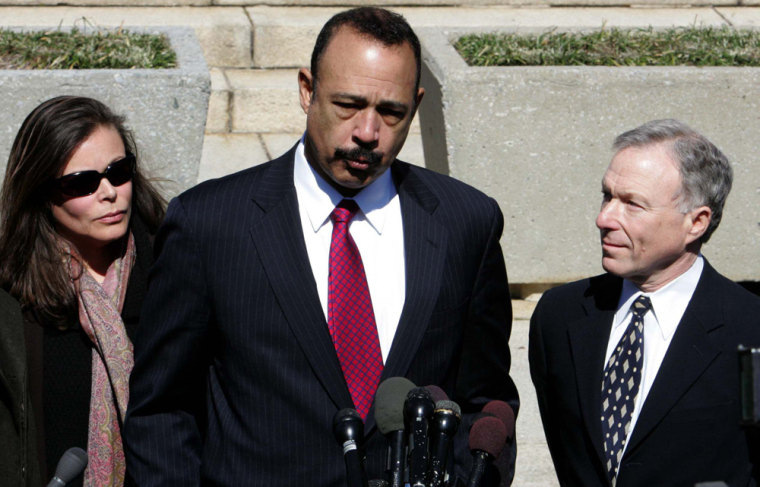Special Counsel Patrick Fitzgerald, in a sentencing memo, has recommended that former White House aide I. Lewis "Scooter" Libby spend 2-1/2 to 3 years in prison for obstructing the CIA leak investigation.
Libby was convicted in March of four of five felony counts against him. He is scheduled to be sentenced on June 5th before U.S. District Judge Reggie Walton
Falsehoods were central
Judge Walton is not compelled to follow federal sentencing guidelines and could impose either a stronger or weaker sentence on Libby.
Fitzgerald wrote in the 18-page memo, "Particularly in a case such as this, where Mr. Libby was a high-ranking government official whose falsehoods were central to issues in a significant criminal investigation, it is important that this court impose a sentence that accurately reflects the value the judicial system places on truth-telling in criminal investigations."
The Special Counsel said that the "deliberate" outing of covert CIA agent Valerie Plame was a very serious breach, "The allegations underlying this investigation were serious: that high-ranking government officials, in the course of responding to political criticisms of the present administration by Ms. Wilson's husband, had deliberately, recklessly or negligently compromised her identity as an intelligence agent, posing risks to intelligence assets and operations."
Unanswered questions
Fitzgerald said that it was apparent from early in the investigation that classified information relating to a covert intelligence agent had been disclosed without authorization.
Also, he writes, "early in the investigation, investigators learned the identities of three officials - Deputy Secretary of State Richard Armitage, Senior Adviser to the President Karl Rove, and Mr. Libby, the Vice-President's Chief of Staff - who had disclosed information regarding Ms. Wilson's CIA employment to reporters."
But he says there are plenty of unanswered questions:
- Were Mr. Armitage, Mr. Rove, and Mr. Libby the only government officials to disclose information about Ms. Plame's CIA employment to reporters?
- Was each particular disclosure by the government officials to journalists deliberate, reckless or inadvertent?
- How did those government officials learn about Ms. Wilson's CIA employment?
- What did those government officials know about the classified nature of Ms. Wilson's employment?
- Precisely what information regarding Ms. Wilson's CIA employment did government officials disclose to reporters, and to how many reporters?
- Were the disclosures made as part of a concerted effort to disclose this information?
- Did other government officials direct or approve these disclosures?
Fitzgerald: Libby could have told the truth
Fitzgerald also recommends to Judge Walton that Libby not be given any leniency in his sentence.
Fitzgerald writes, "As an experienced attorney, Mr. Libby knew well both the seriousness of this investigation and the range of options available to him as the investigation progressed. He, of course, could have told the truth, even if, as was the case for many other witnesses, doing so risked the possibility of criminal prosecution, or personal or political embarrassment."
Libby also could have declined to speak to the FBI agents, invoked his Fifth Amendment rights before the grand jury, or challenged any lines of inquiry he believed improper, said Fitzgerald.
Libby's lawyers have not filed their sentencing documents yet but are expected to ask that he receive no jail time. They have said that if Walton orders prison time, they will ask that Libby be allowed to remain free during appeals.
No one was charged with the leak itself, including the initial source of the disclosure, former Deputy Secretary of State Richard Armitage.
